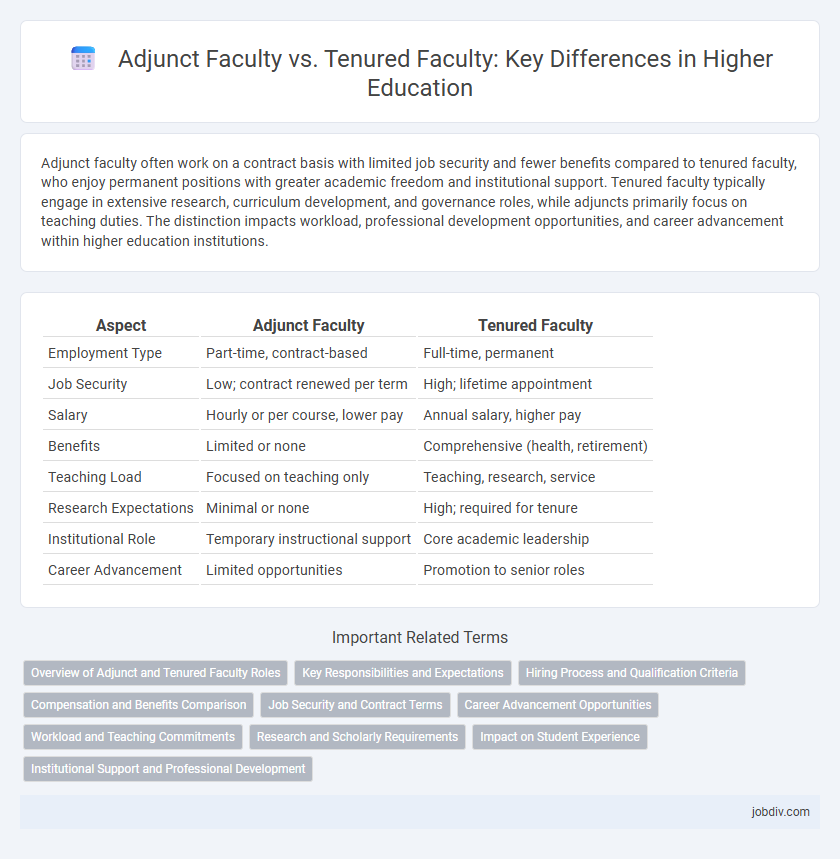Adjunct faculty often work on a contract basis with limited job security and fewer benefits compared to tenured faculty, who enjoy permanent positions with greater academic freedom and institutional support. Tenured faculty typically engage in extensive research, curriculum development, and governance roles, while adjuncts primarily focus on teaching duties. The distinction impacts workload, professional development opportunities, and career advancement within higher education institutions.
Table of Comparison
| Aspect | Adjunct Faculty | Tenured Faculty |
|---|---|---|
| Employment Type | Part-time, contract-based | Full-time, permanent |
| Job Security | Low; contract renewed per term | High; lifetime appointment |
| Salary | Hourly or per course, lower pay | Annual salary, higher pay |
| Benefits | Limited or none | Comprehensive (health, retirement) |
| Teaching Load | Focused on teaching only | Teaching, research, service |
| Research Expectations | Minimal or none | High; required for tenure |
| Institutional Role | Temporary instructional support | Core academic leadership |
| Career Advancement | Limited opportunities | Promotion to senior roles |
Overview of Adjunct and Tenured Faculty Roles
Adjunct faculty are part-time instructors hired on a contractual basis, often responsible for teaching specific courses without long-term job security or research obligations. Tenured faculty hold permanent positions with responsibilities extending beyond teaching, including research, curriculum development, and institutional governance. The distinctions in job stability, workload, and institutional involvement fundamentally shape the roles and expectations of adjunct versus tenured faculty in higher education.
Key Responsibilities and Expectations
Adjunct faculty primarily focus on teaching specific courses without long-term job security or extensive research obligations, often working part-time and balancing external commitments. Tenured faculty carry broader responsibilities, including conducting research, publishing scholarly work, mentoring students, and participating in departmental governance while holding permanent positions. Both roles require commitment to student success, but tenured faculty are expected to contribute significantly to academic development and institutional service.
Hiring Process and Qualification Criteria
Adjunct faculty hiring prioritizes flexibility and specialization, often requiring a master's degree or relevant professional experience, while tenured faculty appointments demand a rigorous evaluation of academic credentials, including a Ph.D., extensive research, and peer-reviewed publications. Tenured positions involve a multi-stage review process encompassing departmental recommendations, external evaluations, and institutional approval. Adjunct roles typically feature expedited negotiations based on immediate teaching needs without the stringent tenure-track requisites.
Compensation and Benefits Comparison
Adjunct faculty typically receive lower compensation and limited benefits compared to tenured faculty, often paid on a per-course basis without access to healthcare, retirement plans, or paid leave. Tenured faculty enjoy higher salaries, comprehensive benefits packages, including medical insurance, pensions, sabbaticals, and job security through tenure. This disparity in compensation and benefits reflects institutional priorities favoring permanent faculty while relying on adjuncts for flexible, cost-effective staffing.
Job Security and Contract Terms
Adjunct faculty typically work on short-term, contract-based arrangements with limited job security, often requiring renewal each semester without long-term guarantees. In contrast, tenured faculty hold permanent positions that offer substantial job security and protection against arbitrary dismissal, secured through rigorous evaluation processes. These contrasting contract terms significantly impact faculty stability and career progression within academic institutions.
Career Advancement Opportunities
Adjunct faculty often face limited career advancement opportunities due to part-time status, lack of job security, and reduced access to institutional resources compared to tenured faculty. Tenured faculty benefit from increased job stability, eligibility for leadership roles, and greater participation in academic decision-making processes, fostering long-term career growth. Universities typically prioritize tenure-track roles for professional development, research funding, and promotion pathways.
Workload and Teaching Commitments
Adjunct faculty typically manage heavier teaching loads with multiple courses across different institutions, often balancing part-time positions and limited access to institutional resources. Tenured faculty generally have reduced teaching commitments, allowing more time for research, administrative duties, and curriculum development within a single institution. The workload disparity impacts job security, academic freedom, and long-term career advancement between adjunct and tenured faculty members.
Research and Scholarly Requirements
Adjunct faculty typically have limited research and scholarly requirements, focusing primarily on teaching assignments without obligations for sustained research output or publishing. In contrast, tenured faculty are expected to produce significant original research, contribute to scholarly publications, and secure grants to maintain their tenure status. The distinction in research responsibilities directly impacts career stability, academic influence, and professional advancement within higher education institutions.
Impact on Student Experience
Adjunct faculty often bring real-world industry experience and specialized knowledge that enrich classroom discussions, fostering practical learning but may have limited availability for student mentorship due to contractual constraints. Tenured faculty typically provide consistent academic guidance, long-term mentorship, and contribute to curriculum development, enhancing the overall educational quality and stability for students. The combination of adjuncts' experiential insights and tenured professors' institutional knowledge creates a balanced and dynamic learning environment that positively impacts student engagement and success.
Institutional Support and Professional Development
Adjunct faculty typically receive limited institutional support and fewer professional development opportunities compared to tenured faculty, who benefit from greater access to resources, funding, and mentorship programs aimed at career advancement. Tenured faculty often have dedicated offices, research grants, and formal sabbatical options, enhancing their academic growth and job security. In contrast, adjuncts frequently face challenges in accessing these supports, impacting their teaching effectiveness and long-term professional development.
Adjunct Faculty vs Tenured Faculty Infographic

 jobdiv.com
jobdiv.com